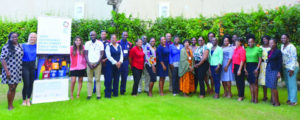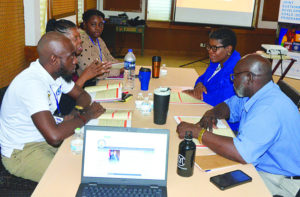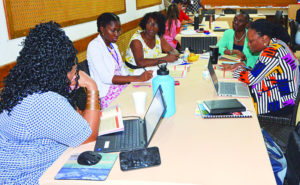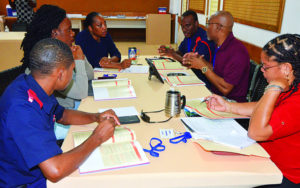
Under the auspices of the Ministry of Social Development, a four-day workshop was held at the Le Vue Conference Room to sensitize officers and agencies in local social services, as well as representatives of various Governmental departments, of their roles, duties, and responsibilities in the event of a national disaster.
The training was sponsored by the World Food Programme and UNICEF.


 Permanent Secretary in the Ministry of Social Development, Dr. Bonnie Richardson Lake, spoke to The Anguillian concerning the training.
Permanent Secretary in the Ministry of Social Development, Dr. Bonnie Richardson Lake, spoke to The Anguillian concerning the training.
We are very grateful to have on island representatives from the World Food Programme supported by UNICEF,” she said. “They are currently facilitating training on social protection in the event of natural disasters.”
“This is important,” she said, “because we have done a lot of work in developing our social protection initiatives with our resilience and shock responsiveness. Coming out of COVID, we rendered some extra aid to persons who had been receiving public assistance. These were persons who were providing foster care, and other vulnerable groups.”
“These sessions of training provide an opportunity to bring together agents from various sectors of the public service to discuss coordinating emergency operations in the event of a shock, whether it might be a pandemic, a hurricane, an earthquake or whatever. This training would enable us to be better positioned to respond,” Dr. Richardson–Lake said.
The training facilitator was Ms. Sarah Lionel, Programme Policy Officer of the World Food Programme, based in Barbados. She is no stranger to the island, having visited Anguilla on prior assignments.
“We are here conducting a stint of Shock Response and Social Protection Training,” she explained. “This has to do with strengthening the social protection system that is already in place and which caters to the wellbeing of the most vulnerable persons in Anguilla.”
“I think the participants of the training are quite enthused about what is imparted to them,” she observed. “They are very engaged, and they are willing to strengthen the social protection system which would provide more efficient and effective service to those in need, in case of a national emergency. They are willing to learn how they can best support each other and coordinate their respective roles with each other in case of a national crisis.”
She said that the participants demonstrated a willingness to work together, and they exhibited an understanding of what it would take to bring specific assistance to the vulnerable people of the community in times of disaster. “That willingness and sense of understanding that I see in the participants encourages me in the work that I do,” Ms. Lionel noted.
She said that the World Food Programme has a joint sustainable development fund that facilitates financing of various activities, such as training, to help countries in the region meet their sustainable development goals.
“I would therefore like to say thanks and express my appreciation to the Ministry of Social Development for selecting the participants from the various departments and agencies, and for so effectively organizing the four-day workshop,” Ms. Lionel remarked.








